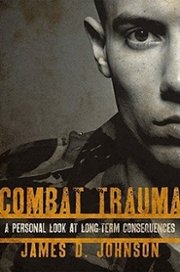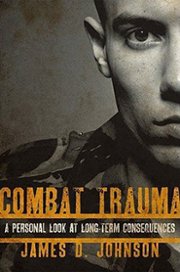

Dr. James (Jim) Johnson kicked off the first Nonfiction Reading Series event of 2013 with a powerful reading from his book Combat Trauma: A Personal Look at Long-term Consequences. Joined by combat brothers and members of the Syracuse Veterans' Writing Group, Johnson, a chaplain during the Vietnam War, offered a moving account of living with post traumatic stress disorder (PTSD). The reading was attended by a number of veterans and community members as well as SU students and faculty, and it even drew people from as far away as Watertown and Carlisle, PA. The event was co-sponsored by the Syracuse University Writing Program, the Aging Studies Institute, the Institute for Veterans and Military Families, the Department of Psychology, the Department of Sociology, and the Department of English.
As both a clinician and a survivor of PTSD, Johnson is able to view and write about the topic from multiple perspectives. Johnson explained that PTSD is "an unseen wound to the mind, heart and soul" as well as “a natural reaction to a very unnatural situation”—namely, exposure to both the presence and threat of death and serious injury. He describes PTSD as a life sentence and identifies himself as 100% disabled as a result of the condition. Combat Trauma is an account of life with PTSD, and fifteen of Johnson’s combat brothers contributed to the book. All proceeds from the book go to the Wounded Warrior Project.
In his reading, Johnson described powerful images that still haunt him in nightmares and flashbacks, and he offered insight into the guilt that he lives with every day. He emphasized the importance of getting help and seeking treatment, as well as the vital role that other veterans can play in helping those with PTSD. For family members, friends, neighbors, co-workers, and health care providers, Johnson offered the following message: “Yes, life goes on, but it is so much better when we can understand and be understood, and can nurture and be nurtured through our historical hurts.”
Johnson was joined by Bob Stumpf, a contributor to the book, who read excerpts about his own flashbacks and his path to getting help. Bob Marcuson and Pete McShane, members of the Syracuse Veterans’ Writing Group, served as respondents and offered their own accounts of their experiences with PTSD. Terry Balfe also participated, and in many ways the event was also a reunion of men who served together and their families.
In her introduction to the reading, Associate Professor Eileen Schell described Combat Trauma as one of the best books out there on PTSD. Schell, who is co-facilitator of the Nonfiction Reading Series and the Syracuse Veterans’ Writing group, explained, “What makes the book so great is the personal and straightforward style in which it’s written, and the honest narratives provided by Jim and his fifteen combat brothers. Although the book addresses suffering and pain, it also offers hope in starting an honest conversation about how the trauma of warfare lingers and continues in the daily lives of those who served.”
The Nonfiction Reading Series, which began in 2008, features local, national, and international writers of all types of nonfiction: memoir and autobiography, the personal essay, political essays, and historical narrative, among others. Recent participants include Mary Karr, Arthur Flowers, Stephen Kuusisto, Harriet Brown, and Minnie Bruce Pratt.
—story by Emily Dressing
March 2013
